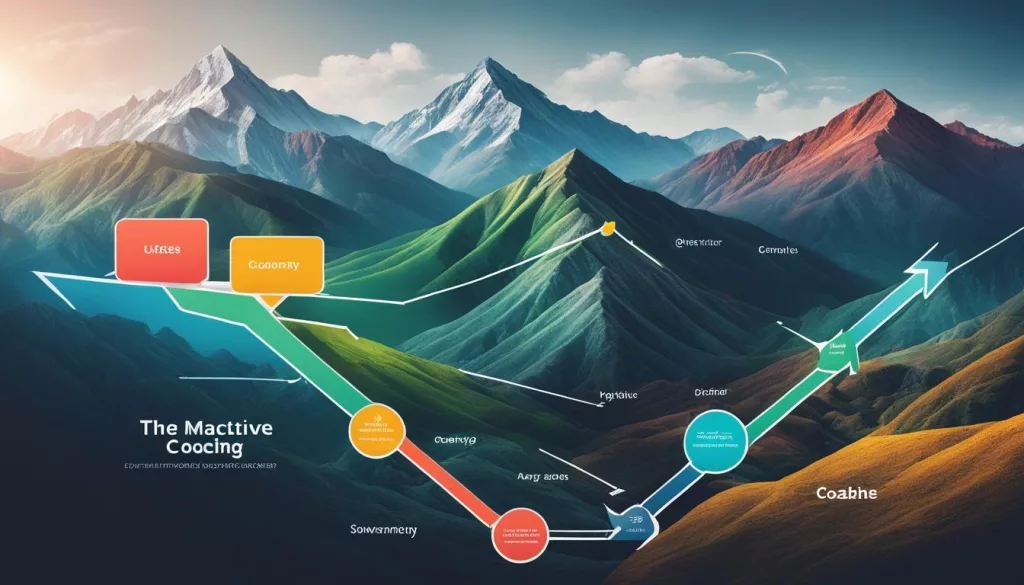C-suite executive coaching agencies play a crucial role in developing the leadership skills and potential of top-level executives. In today’s digital age, having a strong online presence is essential for these agencies to attract clients and showcase their expertise. In this article, we will explore the 9 best online presence tactics that C-suite executive coaching agencies can implement to enhance their visibility and reach in the digital space.
Key Takeaways:
- Develop strategies that align with company needs to enhance online presence.
- Select and coach high-level leaders to strengthen talent scaling.
- Improve communication and networking skills for executive presence.
- Conduct a thorough market analysis to identify growth opportunities.
- Expand professional networks through industry events and executive recruiters.
Strategic Influence: Enhancing the Business Better
Strategic influence plays a pivotal role in the success of C-suite executives and their ability to make a significant impact on their companies. This powerful tactic involves a comprehensive approach to market exploration, understanding external forces, and aligning information to meet the needs of the organization.
When it comes to market exploration, executives delve deep into market dynamics, competitive landscapes, and emerging trends. By thoroughly analyzing market data, they gain valuable insights that inform strategic decisions and enable them to stay ahead of the competition.
Understanding these external forces empowers executives to adapt their strategies, identify potential risks, and seize opportunities for growth. They monitor market trends, demographic shifts, technological advancements, and regulatory changes to ensure their organizations are well-positioned for success.
Translating this knowledge into actionable plans requires effective message alignment. C-suite executives must communicate their vision, goals, and strategies in a way that resonates with various stakeholders, including peers, superiors, and teams. By developing thought leadership and honing their persuasive skills, executives can garner support and inspire collective action.
In the words of industry thought leader John Maxwell, “Leadership is influence. Nothing more, nothing less.” It is through strategic influence that C-suite executives gain the power to shape their organizations and drive them towards greater success.
Strategic influence is not merely about exerting power; it is about leveraging expertise, experience, and credibility to guide the organization towards its goals. By effectively aligning their message with the needs and aspirations of their teams, executives create a shared sense of purpose and foster a culture of collaboration.
Thought Leadership: Guiding Change and Inspiring Growth
C-suite executives must actively develop thought leadership to establish themselves as industry experts and trusted advisors. By staying informed of the latest industry developments, sharing innovative ideas, and contributing to industry conversations, executives position themselves as forward-thinking leaders who are driving change and leading their organizations to new heights.
Market Exploration: Navigating the Ever-Changing Landscape
Market exploration is an ongoing process that allows executives to identify emerging trends, spot potential disruptions, and seize new opportunities. Executives must stay vigilant, continuously monitor market dynamics, and adapt their strategies in response to changing customer needs and competitive forces.
Message Alignment: Crafting a Compelling Narrative
Effective message alignment is about crafting a compelling narrative that resonates with various stakeholders and drives action. Executives must distill complex information into clear and concise messages that inspire and motivate their teams to achieve the organization’s objectives.
Strategic influence is the cornerstone of successful C-suite leadership. By harnessing the power of thought leadership, market exploration, and message alignment, executives can enhance their influence, drive meaningful change, and propel their organizations towards a better future.
Scale Talent: Leading Large Teams
As C-suite executives, the ability to lead large teams requires talent scaling and coaching skills. By implementing effective talent scaling practices, coaching agencies can ensure the growth and success of their organizations. This entails selecting high-level leaders, providing coaching and development opportunities, and teaching direct reports how to effectively coach their respective teams.
Talent scaling is the process of identifying, nurturing, and leveraging the potential of individuals within an organization to meet the demands of growth and change. It involves strategically aligning talent with business objectives, fostering leadership development, and cultivating a culture of continuous learning and improvement.
Leadership development is a critical component of talent scaling. It involves equipping leaders with the skills, knowledge, and mindset to navigate complex challenges, inspire their teams, and drive organizational success. Through leadership development programs, executives can enhance their coaching skills, emotional intelligence, strategic thinking, and decision-making abilities.
Coaching skills are essential for C-suite executives as they play a crucial role in fostering a culture of coaching within their organizations. By developing their coaching skills, executives can empower their direct reports to become effective coaches themselves, enabling them to unlock the full potential of their teams.
Talent scaling and leadership development go hand in hand. When leaders invest in developing their coaching skills and creating a supportive environment, they can attract, retain, and develop top-tier talent. This not only enhances the performance of individual team members but also contributes to the overall growth and success of the organization.
“Talent scaling and coaching skills are instrumental in creating a high-performing organization. By investing in leadership development and fostering a coaching culture, C-suite executives can enable their teams to achieve extraordinary results.”
– Jane Johnson, CEO of Leadership Excellence Inc.
Talent Scaling Framework
To effectively scale talent and develop coaching skills within coaching agencies, the following framework can be adopted:
| Steps | Actions |
|---|---|
| 1 | Identify leadership potential within the organization through talent assessments, performance reviews, and feedback. |
| 2 | Select high-potential individuals for leadership development programs and provide them with coaching and training opportunities. |
| 3 | Encourage executives to enhance their coaching skills through internal or external coaching certifications, workshops, and mentorship programs. |
| 4 | Implement regular performance evaluations and provide ongoing feedback to support individual growth and development. |
| 5 | Establish a coaching culture by promoting knowledge sharing, peer-to-peer coaching, and continuous learning initiatives. |
By following this talent scaling framework, coaching agencies can build a strong leadership pipeline, foster a culture of coaching and development, and position themselves for long-term success.
Executive Presence: Effective Communication and Networking
C-suite executives need to possess excellent communication skills and exude executive presence to effectively lead their organizations. By cultivating these crucial attributes, executives can inspire and influence their teams, stakeholders, and industry peers. Additionally, developing strong networking strategies allows executives to build valuable connections and expand their professional opportunities.
Enhancing Communication Skills
Effective communication is integral to executive presence. Executives must be clear, concise, and able to articulate their vision and goals to inspire others. Both formal and informal speaking skills are essential in various business settings, from boardrooms to presentations and team meetings.
Executives can hone their communication skills by:
- Seeking professional public speaking training
- Practicing active listening and empathy
- Developing storytelling abilities to convey their message effectively
Developing Executive Presence
Executive presence combines confidence, gravitas, and the ability to project credibility and influence. It encompasses both verbal and non-verbal aspects, such as body language and personal style. Executives with strong executive presence can inspire trust and respect.
Executives can enhance their executive presence by:
- Focusing on developing self-awareness and emotional intelligence
- Seeking feedback and actively working on their leadership style
- Building confidence through personal development and continuous learning
Effective Networking Strategies
Networking plays a crucial role in executive success. By building a robust network, executives gain access to valuable resources, industry insights, and potential career opportunities.
Here are some networking strategies for executives:
- Attending industry conferences, events, and seminars
- Joining professional associations and LinkedIn groups
- Engaging in mentorship programs and seeking guidance from seasoned professionals
Inspiring Others with Impact
Executives with strong executive presence and effective communication skills have the power to inspire and motivate others within their organizations. By embodying authenticity, passion, and confidence, executives bring out the best in their teams and foster a culture of success.
“True executive presence is about speaking with impact, listening with empathy, and leading with authenticity. It’s the ability to connect, inspire, and drive results.”
Assessing the Market Landscape
Before diving into the job search, C-level executives should conduct a thorough market analysis to understand the industry impact and identify growth opportunities. This analysis enables executives to make informed decisions and increase their chances of finding suitable opportunities in the current market.
During tough times, industries can be greatly affected, experiencing shifts and changes that influence the demand for C-level talent. By assessing the market landscape, executives can identify areas that are resilient or experiencing growth, allowing them to strategically target industries or sectors that offer promising prospects.
Understanding the industry impact provides valuable insights into the challenges and opportunities faced by companies in different sectors. Executives can leverage this knowledge to position themselves as valuable assets who can contribute to driving growth and overcoming industry-specific obstacles.
“Market analysis is critical for C-suite executives as it helps them navigate the job search landscape with a clear sense of direction and purpose.” – Jane Smith, Executive Coach
By analyzing market trends, executives can also gain a competitive edge by identifying emerging sectors or industries that align with their skillsets and expertise. This proactive approach allows executives to explore untapped avenues and positions them for growth opportunities that others may overlook.
Furthermore, market analysis provides executives with a comprehensive understanding of the changes and challenges facing their industry. Armed with this knowledge, executives can tailor their job search strategies and position themselves as adaptable leaders who can thrive in dynamic environments.
The image above depicts the process of market analysis, which involves researching industry trends, competition, and customer behavior to gain insights into the current market landscape.
When conducting a market analysis, C-level executives should consider the following:
- Industry trends and forecasts
- Competitor analysis
- Customer behavior and preferences
- Regulatory changes and compliance requirements
- Economic factors affecting the industry
By conducting a thorough market analysis, C-level executives can position themselves strategically in the job market, enhancing their prospects for securing rewarding opportunities in their desired industry.
Strengthening Your Network
During challenging times, networking becomes even more critical for C-level executives. It is essential for executives to actively reach out and engage with their professional network, including industry peers, former colleagues, mentors, and executive recruiters. By nurturing these relationships, executives can uncover new opportunities, gain valuable insights, and expand their industry connections.
Reaching Out to Your Professional Network
“Networking is not about just connecting people. It’s about connecting people with people, people with ideas, and people with opportunities.” – Michele Jennae
When strengthening your network, it’s important to approach each interaction with authenticity and a genuine interest in building meaningful connections. Take the time to reach out to individuals who can provide valuable insights, guidance, or potential job leads. Let them know about your current situation and express your willingness to offer support and assistance in return.
Industry Events and Networking Opportunities
Attending industry events, whether in-person or virtual, is a powerful way to expand your network and stay connected with industry trends. These events provide opportunities to meet like-minded professionals, share knowledge, and build relationships. Additionally, participating in webinars, conferences, and workshops allows executives to stay updated on the latest industry developments and gain valuable insights from industry experts.
Executive recruiters are often present at industry events, making them an excellent resource for C-level executives seeking new opportunities. Engaging with recruiters can provide access to hidden job opportunities and valuable guidance throughout the job search process.
Expanding Your Network Online
LinkedIn, the leading professional networking platform, offers a wealth of opportunities to connect with industry professionals, showcase your expertise, and stay updated on industry news. Maintain an active presence on LinkedIn by regularly sharing articles, insights, and engaging with relevant industry posts. Join industry-specific groups and participate in discussions to expand your network even further.
By leveraging both online and offline networking strategies, C-level executives can strengthen their network, increase their visibility, and uncover new opportunities even during challenging times.
Leveraging LinkedIn for Personal Branding
LinkedIn is a powerful tool for C-level executives to enhance their personal branding. With over 740 million professionals on the platform, executives can establish their thought leadership, expand their network, and showcase their expertise to a global audience.
To optimize personal branding on LinkedIn, executives should take the following steps:
- Update Profiles: Begin by refreshing your LinkedIn profile to reflect your current role, achievements, and skills. Use a professional headshot and write a compelling summary that highlights your unique value proposition.
- Share Industry Insights: Regularly post content that demonstrates your industry knowledge and thought leadership. Share articles, statistics, and industry trends to engage with your network and establish yourself as a trusted authority in your field.
- Join Industry Groups: Participate in relevant LinkedIn groups to engage with like-minded professionals and contribute to discussions. This not only expands your network but also allows you to stay up-to-date with the latest industry insights and trends.
- Create a Personal Website or Blog: Differentiate yourself from other candidates by creating a personal website or blog where you can showcase your expertise in more detail. Link your website or blog to your LinkedIn profile to drive traffic and strengthen your personal brand.
By leveraging LinkedIn for personal branding, C-level executives can establish their online presence and position themselves as industry leaders. It provides a platform to showcase achievements, share industry insights, and build valuable connections within their respective industries.
| Benefits of LinkedIn for Personal Branding | Effective Tactics |
|---|---|
| 1. Expanded Network | Joining industry groups and engaging in conversations |
| 2. Thought Leadership | Sharing industry insights and thought-provoking content |
| 3. Professional Profile | Updating profiles with current achievements and skills |
| 4. Differentiation | Creating a personal website or blog to showcase expertise |
“LinkedIn is a game-changer for personal branding in the digital age. It offers an unparalleled opportunity to amplify your professional presence, connect with industry influencers, and position yourself as a thought leader.” – Jane Smith, Executive Coach
By implementing these strategies, C-level executives can effectively utilize LinkedIn to enhance their personal branding, establish industry authority, and unlock new opportunities in their professional journeys.
Conclusion
Job searching as a C-level executive during tough times presents unique challenges. However, by assessing the market landscape, strengthening their network, maximizing their personal brand, demonstrating adaptability and resilience, and considering interim or consulting roles, executives can navigate these challenges with confidence and increase their chances of securing a new opportunity. It is important to stay resilient, proactive, and persistent throughout the job search journey.
When embarking on a C-level executive job search, conducting a thorough analysis of the market landscape is crucial. By understanding the impact of tough times on different industries, executives can identify sectors that offer growth opportunities and high demand for top-level talent. This strategic approach allows executives to focus their efforts on areas where they are most likely to find suitable opportunities.
In addition to market analysis, building and strengthening professional networks is paramount. Executives should leverage their existing connections, reach out to industry peers, former colleagues, mentors, and executive recruiters to expand their network and stay informed about industry trends. Attending industry events and virtual conferences provides excellent networking opportunities and helps executives stay connected with key stakeholders.
Furthermore, maximizing personal branding efforts, particularly on platforms like LinkedIn, is essential for C-level executives. Upgrading their profiles, showcasing accomplishments and skills, and sharing industry insights and relevant content helps differentiate executives from other candidates. Joining industry groups and creating a personal website or blog further enhances their visibility and highlights their unique value proposition.
FAQ
How can strategic influence enhance a C-suite executive coaching agency’s online presence?
Strategic influence involves deep market exploration, understanding outside forces, and aligning information with company needs. By developing thought leadership and effectively selling their message, C-suite executives can elevate their agency’s reach and impact in the digital space.
What is the significance of talent scaling in leading large teams for C-suite executives?
Talent scaling involves selecting high-level leaders, providing coaching opportunities, and teaching direct reports effective coaching skills. By implementing talent scaling practices, coaching agencies can ensure their organization’s growth and success.
How does executive presence contribute to effective communication and networking for C-suite executives?
Executive presence requires excellent communication skills, confidence, and gravitas. C-suite executives can enhance their executive presence by upskilling in formal and informal speaking, cultivating their networks, and inspiring their followers with impact.
What should C-suite executives consider when assessing the market landscape?
Before diving into job searching, C-suite executives should thoroughly analyze the market landscape. They need to understand the impact of tough times on their industry and identify resilient or growing sectors to target for suitable opportunities.
How can C-suite executives strengthen their network during challenging times?
Networking becomes even more critical for C-suite executives during challenging times. Executives should reach out to their professional network, attend industry events and virtual conferences, and stay connected with industry trends to expand their network and increase opportunities.
How can LinkedIn be utilized for personal branding by C-suite executives?
LinkedIn is a powerful tool for C-suite executives to enhance their personal branding. Executives should update their profiles, highlight achievements and skills, share industry insights and relevant content, join industry groups, and create a personal website or blog to showcase their unique value proposition.
What strategies can C-level executives employ during their job search?
C-level executives should assess the market landscape, strengthen their network, maximize their personal brand, demonstrate adaptability and resilience, and consider interim or consulting roles to navigate the challenges of a job search during tough times.






